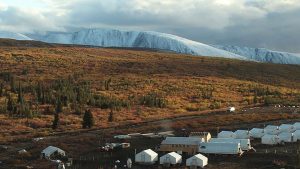A Kaska chief says the revised decision document for a proposed mine in southeast Yukon has done little to change his view on the project.
The document was posted on the Yukon Environmental and Socio-economic Assessment Board (YESAB) on March 8.
“Once again, we’re not happy with the decision,” Chief Dylan Loblaw of the Ross River Dena Council (RRDC) told APTN News. “At this time, we can’t support industry on this specific project.”
It’s the latest development in a legal battle surrounding the Kudz Ze Kayah mining project.
The proposed open pit mine by BMC Minerals would be located on Kaska territory in an area of cultural significance, especially when it comes to caribou.
Yukon government, Natural Resources Canada and Fisheries and Oceans Canada, are decision bodies for the mine. The government greenlighted the project to go to the next stage in the approval process, which is the regulatory process, in June 2022.
The decision prompted RRDC, on behalf of the Kaska Nation, to launch a judicial review later that same year.
On Jan. 2, the Yukon Supreme Court ruled the territorial and federal governments mostly upheld their duty to consult with the Kaska about the mine.
However, it also ordered the decision document allowing the project to proceed to the regulatory process be set aside to allow for a consultation meeting regarding a last-minute submission by the Kaska just hours before the mine was approved to proceed.
The governments would then be required to issue another decision document on the mine.
The revised document was issued following consultation meetings on Feb. 7 and 8 with RRDC, the Liard First Nation (LFN) and Kaska Elders and community members.
“The Decision Bodies engaged in dialogue with Kaska in order to understand whether the modified terms and conditions adequately mitigated effects to Kaska rights and if they did not, to understand how they could be varied or could be added to ensure the continued meaningful exercise of Kaska rights,” the government decision said.
“However, throughout the consultation meeting, Kaska were less inclined to discuss the modified terms and conditions and reiterated the importance of the area for Kaska and their opposition to the Project.”

Like the original decision, the revised document recommends the project be able to proceed, though it includes some changes and additional terms and conditions.
A water treatment plant proposed by BMC has now been added as a term and condition, “guaranteeing it is tracked within regulatory instruments,” according to the document.
“The Decision Bodies believe this addition partially addresses concerns raised by Kaska with respect to water quality,” it said.
Another additional term and conditions contains a “pre-condition” requested by Elders to have an access road closed seasonally.
The Finlayson Caribou Herd Oversight Committee’s, a proposed independent oversight board composed of Kaska representatives, “will regularly review and consider the success of the Project’s mitigation and management strategies – this includes the operation of the access road on a seasonal duration or shorter basis,” the document states.
Other commitments in the document include further dialogue with the Kaska concerning cumulative effects and the proposal of a project agreement between RRDC, LFN and the governments.
The agreement would provide direction on identifying and resolving environmental and other concerns during the mine’s operation and could include oversight committees, consultation plans, topic-specific technical working groups, Elder advisory panels and other types of engagement and advisory groups.
Allan Nixon, BMC’s vice-president of external affairs, said in a statement the company is confident it can meet all the requirements of the decision document and is proceeding with major permit applications.
“As we have done since before we purchased the project, we will continue to engage with Kaska to ensure we address any remaining concerns they may have and to ensure we are maximizing opportunities for their participation in, and benefit from, the project. Nothing has changed that commitment,” he said.
Yukon government spokesperson Diana Dryburgh likewise said in a statement it will continue to consult with the Kaska for the authorizations to construct and bring the mine into production.
“More broadly, Government of Yukon will also continue to engage meaningfully with the Kaska in accordance with its commitment to reconciliation and to building strong relationships with First Nations governments,” she said.
Representatives for the federal government did not reply to APTN’s requests for comment by deadline.
But Loblaw said the revisions have done little to ease concerns about the mine, especially regarding its proposed location.
“The mine is simply in the wrong place,” he said. “We feel that a mine of that size and magnitude, in a core caribou refuge, shouldn’t be designed and built at this time.”
“The project has been varied, but the modifications aren’t adequate enough to fit our terms and conditions set up by our nation, specifically our Elders,” he added.
Last month, the Kaska Nation filed notice to appeal the Supreme Court’s ruling. They want the June 2022 ruling allowing the mine to move to the next stage to be quashed and set aside, among other things.
Loblaw said the nation plans to continue with its appeal and will be participating in the regulatory process.
“There’s a lot of work that needs to be done and obviously some issues need to be addressed,” he said.
“We’re here is to fight for our children and for our culture, our livelihoods.”









